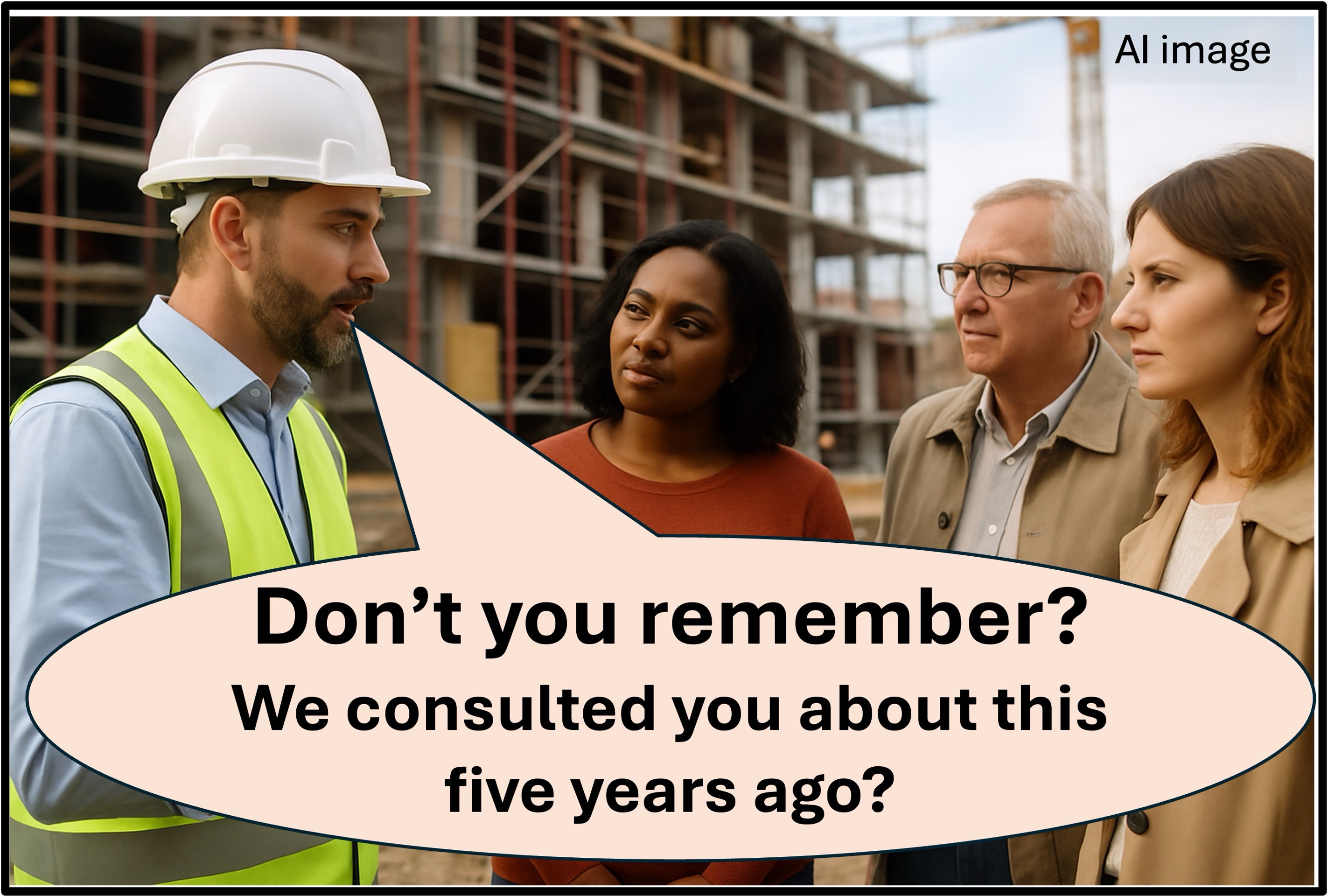This is Blog No 104
When do you stop consulting?
Indeed, do you ever?
I’ve been wondering about this ever since I began trying to construct a new framework for consultation – which I hope to publish at the end of the Summer.

My argument is that we have become too fixated on one form of public and stakeholder consultation. Where a consultor contemplates a significant decision, policy or a programme of action, and seeks responses and reactions to a range of proposed options. It is usually quite formal, takes some time (traditionally 12 weeks) and rightly attracts the application of legal rules known as The Gunning Principles. My new framework will consider the other forms that consultation can take, and how we might establish and promote best practice.
One thing has become abundantly clear. It is neither possible nor desirable in many cases, to identify a start-point – or an end point to consultation. This is already recognised by the use of such terms as ‘continuous engagement’ which have been used for years in environments like the NHS, where there is a perpetual relationship with known representative bodies like Healthwatch or Patient Participation Groups (PPGs) Here, as in other public services or policy areas, one issue seamlessly morphs into another.
Recently, I have been looking at the latter stages of the process – when formal consultations have finished and when the action moves on. We can call this the IMPLEMENTATION phase. Maybe the project has been approved – we WILL build this road or railway. We WILL apply this new legislation. Or we WILL embark upon this initiative. The pros and cons will have been thrashed out. Decision taken! Policy adopted! Programme approved! It is seldom the end of the argument, but, normally it is the end of the process. If there are continuing issues, we need to find some other machinery to handle them, and in a typically British pragmatic way, we have usually found some way to ‘fudge’ it!
In Parliamentary terms, once legislation has passed, it becomes the role of Departmental Select Committees to keep a watching brief and monitor the application of new laws. Maybe an All-Party Parliamentary Group (APPG) might be set up, receiving financial support from lobbyists or pressure groups with a specialist interest. And those responsible for implementation (eg a Government department) might themselves create a Stakeholder Reference Group or similar to sound out views about various aspects of what happens next.
But this is often less about relations with politicians and bureaucrats. Frequently, those most impacted by major decisions are ordinary people, and they need a way to be heard on a vast range of questions that may arise as time progresses, and practice varies considerably in the way organisations handle this dynamic.
Here I must declare an interest, for a few years ago, I was intrigued to learn that in the Netherlands, construction Companies had started using a simple but sophisticated mobile application to keep residents and businesses informed when major projects went ahead. The firm was then called Site Podium, and its strength was that it was a cost-effective tool that was usable by anyone with an interest in what was going on. Not so much a consultation – but what I call community dialogue – just a means for those building or implementing something to have easy, informal contact with those who are affected by their progress.
The Company name has now changed and the system is now called Publiq – and I advise them. But I wonder if it is the start of something much wider, for it is not only builders that need to create a mechanism for talking to those whose lives they may affect. True, a local authority which badly needs to explain why roads will be closing for a month to undertake repairs, or wants to announce some local net-zero initiative or another can use Facebook or other social media applications. But many of the issues and questions are very personal and these platforms are seldom as useful for one-to-one exchanges. Neither do the analytics support the organisation in gathering insights about public or stakeholder reactions to what’s happening.
Some years ago, when the Elizabeth Line was a series of massive ‘holes in the ground’ by ‘Crossrail’, I was briefed that there was a problem. It seemed that these enormous building projects affected thousands of businesses, residents, shoppers, commuters etc and that each contractor (they were all different! ) handled the engagement challenge differently. Could we not, possibly devise a set of common standards they could all follow? What emerged was a set of guidance that inevitably touched upon the legacy from the previous consultations. What had people been told? What were their expectations? Who was being compensated? Who wasn’t? And then, the realisation that the consultations were years ago; the stakeholders were now different; and in central London, they were VERY different.
It is not just infrastructure! The continuing implications of social and economic policy changes can be just as demanding in their need for continuous dialogue. Consider problematic areas such as Special Educational Needs & Disability (SEND) where resources never matched the legislative ambition. Or the impact of immigration policy changes on the financing of the University Sector? Or something yet to happen like the forthcoming Regulation of professional football?
What is clear is that consultation should not stop when key decisions are taken and that the requirement to listen and be influenced by informed stakeholder views should continue well into the IMPLEMENTATION phase. For this, we need a better framework (not much longer to wait!) more tools like Publiq, and probably a change of culture to acknowledge the enhanced role of effective dialogue over a considerably longer period.
Rhion H Jones
27 June 2025
Leave a Comment
I hope you enjoyed this post. If you would like to, please leave a comment below.